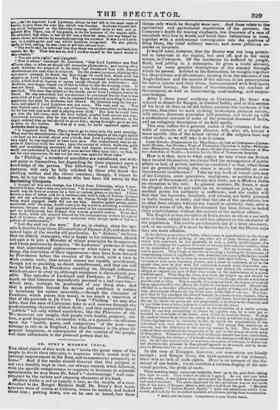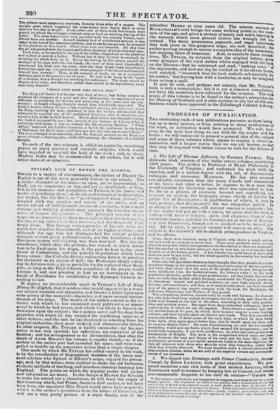DR. SPRY'S MODERN INDIA.
THE chief object of this work is to " invite the great mass of the people to direct their attention to inquiries which would lead to national improvement in the East, and tocommercial prosperity at home." And if the reader should discover that this purpose is not very steadily kept in view, nor always treated, when followed, with the specific completeness so requisite in business or scientific speculations, he may deem Dr. SPRY'S " shortcomings " well com- pensated by the variety and amusing character of his book. Modern India is not so exactly a tour, as the results of a tour. Attached to the Bengal Medical Staff, Dr. SPRY'S first head- quarters were of course at Calcutta, where he landed, and looked about him ; putting down, not all he saw or heard, but those
things only which he thought were new. And these relate to the agriculture and agricultural capabilities of the province, the Company's depot for rearing elephants, the discovery of a race of . cannibals who live in woods and build their habitations in trees,. together with a professional investigation into the qualities of Dorn Dum, the chief military station, and some judicious re- marks on hospitals. It would seem, however, that the Doctor was not long permit- ted to luxuriate in the capital, but sent off, and in the rainy season, to Cawnpore. Of the hardships he suffered by jungle,. flood, and jolting in a palanquin, he gives a lively account,. varied by some graphic descriptions of the scenery through which lie passed. Arrived at his destination, he mingles together his observations and adventures; turning from the rammer:sof the Anglo-Indians and the morals of the natives, to his prescriptions for 'native nabobs and their wives, f'acts connected with field sports or natural history, the duties of functionaries, the conduct of Government, as well as horse-racing, road-making, and suspen- sion-bridges.
After a three years' residence at Cawnpore, Dr. SPRY was ordered to depart for Saugor, in Central India; and in this section of his book he does as he did before, narrates the incidents of his journey, describes its most striking landscapes, pictures society, tells stories, discusses principles and practice, and winds up with a professional account of some of the principal diseases of ludia, and an eulogistic description of its field sports. This may suffice for a general notion of the volumes; but the table of contents of a single chapter, will, after all, convey a more specific idea of the mixed variety of the Subjects than any other mode ; so we will take it as it comes.
Leave Keitah—Preparations for Marching—Ai rival at Cawnpore—Canton- ment Houses—Ice Houses—Want of Protestant Churches in India—Missiona- ries—Musquitoes, Scorpions, and Snakes—mike-charmers—lnfluence of Mer sic—Anecdote of Snakes—Antidote for the Bite of venomous Serpents.
How is it that, turn to what region we may where the British have located themselves, we always find the management of public affairs so bad, of private matters so excellent ? or that, when these last go generally wrong, the cause is mostly traceable to some Government interference ? Take up any book of travel', into any of the Colonies, some ignorance, negligence, or positive fault on the part of Government, is always met with; nor is Modern India an exception to the rule. In general matters, Dr. SPRY, it may be alleged, should be put aside as an incompetent judge, but on medical points his authority is sufficient; and the reader will find that the barracks, hospitals, and prisons, are badly planned or badly located, or both ; and that the site of the up-stations has so often been chosen without any regard to salubrity, that, after a frightful waste of life, the Government has been driven to forbid their establishment without the opinion of the medical ollicers.
The English prison discipline in India seems much on a par with ours at home, except that it is still less adapted to the character of the population. The native punishments are of a more summary, and, to our notions, of a Inure ha; bayous kind ; but the Doctor says they are more effective.
In the British possessions of India, when a man is apprehended on the charge of shop-lifting, pocket-picking, or any other act of petty larceny, and after- wards duly convicted, he has generally to visit a public establishment of • certain description for a period of twelve or twenty-four calendar mouths, there to be maintained at the Government expense. Not so, however, with the native powers. They laugh at the idea of erecting a building for the purpose of congregating a host of vagabonds ; who, were they not iricorirgiblebelore, would. be sure to become so by so close an association with their fellows. They have recourse to a far more immoraly process, and it must be confessed, as far as the people they have to deal with are concerned, a touch more impressive one. Moo cover, they equally scout, as preposterous and absurd, the notion of being obliged to expend any part of their urea money in the maintenance of a prison establishment. What they do, then, is to have the culprit up, and should he be proved to have committed the crime laid to his charge, execute a summary punishment on him. This is usually of a corporal kind, the degree of severity being apportioned to the offence for which he has been convicted. Should the offender be a chevalier ellindustrie, and proved guilty of doing evil in the small way, in a tangent off goes the tip of his nose, or the lobe of one ear. If it hap- pen, that be has outraged the laws of honesty in a more serious manner, then a more lamentable mutilation takes place : the right hand, from being considered the one by which the guilty act was perpetuated, is doomed to be removed, and by one blow from a heavy tulwar it is seeded nom the wrist. Whenever a notorious thief is caught in the territories of a native prince, unless he can stop proceedings in limine by a golden sop, he is sure get to branded by tremment of this kind ; after which he is set at liberty. To stop the profuse hermit.' hige from the stump at the wrist, a red. hot iron is applied. These clippings serve as character. marks, by which the respectability of the individual may ever afterwards be known. The stump they endeavour to conceal, but the deficieucy of the nose tip cannot be hid. Men who have suffered these mutilations are frequently to tie met in the streets of every town of Hindustan. Whenever it occurs that deliberate murder has been committed, (as in Thuggee, for instanc• ) tl e death which the destroyer buthrs is a peculiar one. lie is either incased alive in masonry, ur a piece of ordnance is drawn out and shotted—the prisoner is then placed opposite to its mouth, and by its ex- plosion blown into the air, shattered into a thousand bits.
In the case of Thuggee, however, our executions are bloody enough ; and Saugor being the head-quarters of the tribunal, there was no lack of such sights. Here is an account of the dis- missal of one batch ; which exhibits a curious display of the uni- versal passion, the pride of caste.
When morning came, numerous hackeries drew up to the gaol-door, taking five men in each. They looked di-radially haggard. As one cart was laden after the other, it was drawn away, summated by Sems with fixed bayonets and loaded muskets. The place appointed for the executions war on the north side of the town of Saugor, about a mile and a half from the gaol. " Roolunt Doctor Sahib," Saturn Doctor Sahib," • were the salutations which I re- ceived, as I rude by the wretched tumbrels which were jolting them to execution.
• Adieu, DoAor Sahib, Compliments to you, Doctor Walla.
• The gibbets were temporary erections, forming three sides of a square. The upright pests which supported the cross-beams were firmly fixed in stone masonry five feet in height. From either side of these walls foot-hoards were placed, on which the unhappy criminals were to land on reaching the top of the ladder. Tie cross brains were each provided with ten running halters, equi- distant from one another. As each hackery load of malefactors arrived, it was taken to the foot of the respective ladders ; and as one by one got out, he mounted to the platform or foot.board. .Their irons were not removed. All this time the air was pierced with the hoarse and hollow shootings of these wretched men.
Each man, as be reached to the top of the ladder, stepped out on the platform and walked at once to a halter. Without loss of time he tried its strength by weighing his whole body on it. Every one having by this means proved the strength of his rope with his own bands, (for none of them were handcuffed,) introduced his head into the noose, drew the knot firmly borne immediately behind the right ear, and amid terrific cheers jumped off the board and launched himself into eternity ! Thus, in the moment of death, we see a scrupulous attention paid to the preserea.ion of caste. To wait to be hung by the hands of a claimer, was a thought too revolting for endurance. The name would be disgraced for ever ; and therefore, rather than submit to its degradation, every man hung himself!
"RINGS LOVE \VINE luxe: °Turn MEN."
The King (of Oude) had become very fond of wire; but being anxious to maintain the character of a good and true illahomedan, he expetienced great difficulty in gratifying his desires, and preserving at the same time his can- sietency : at length a happy thought struck him, which fully succeeded. The hookah butdar, who is always a very confidential servant, was Called in ; when the King, knowing his man, explained to him his wishes, and directed that whenever he required any of the prohibited beverage, that it should be con- veyed to him in time hookah bottom. The hookah-bearer was directed to bring the hookah prepared for use ; but, instead of the bottom of it being filled as ordinarily with water, it was to contain the life-inspiring Madeira. " Akbar," muttered the faithful attendant, as he left the apartment, by the beard of Alahomed, the Devil alone could have put this idea into my master's brain !" The man managed it so admirably, that the Nawatth assured me the King was never without a cheering glass, while still retaining the character of a faithful disciple.
To each of the two volumes is added an appendix, containing papers on many practical and scientific subjects, which a ould have impeded or overlaid the body of the work ; and, in short, Modern India may be recommended to all readers, fur it will either instrect or entertain.



























 Previous page
Previous page